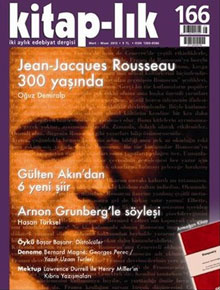
The protests over the arrest of Istanbul mayor Ekrem İmamoğlu are the biggest display of anti-government feeling in Turkey since Gezi Park. Again, people are challenging the culture of public silence; and again, they are being punished for doing so.
Murat Yalçin of “Kitap-lik” asserts that culture and the arts thrive on individual awareness and thought, not collective sensibilities. Thus every journal has learn to cherish its knowledgeable readers – for which there are no simple formulas based on “responsibility”, “mission” or service.
Roughly speaking, what percentage of your budget currently comes from sales and what percentage from and advertising? How do you deal with economic difficulties? Are you widening your field of activities beyond strictly publishing? Are you exploring new business models, lobbying cultural decision-makers, or appealing to the public?
Kitap-lik is published by Yapi Kredi Publishing (YKY), so it is financed by the publisher and receives ad revenue from group (Koç Holding) companies.
While journals in Europe continue their existence largely with the help of public support, this is not the case in Turkey. What should be done in Turkey to secure public support for art and literature journals?
I have doubts about public-sponsored arts in Turkey. Journals should be able to survive on their reasons for being, readers and subscribers, and ad revenue.
What is your distribution and sales strategy? How do you take your journal to its readers?
We distribute via book distributors and electronic means.
Journals tend to extend their publication intervals due to economic difficulties. How does this impact a journal’s communication with its readers?
We shifted Kitap-lik to a bimonthly period after ten years of monthly publishing. This was partly because there are too many literary journals, but also because we wanted to prepare better content. Readers did not have a problem with this.
Do you have a website? How much of your content do you make accessible on it and what other uses does it serve? How do you make use of social media and what do you perceive to be its benefits?
Content is regularly posted on the YKY website. We are also on sale as an e-journal, so we don’t post the magazine online. We have no social media presence.
Are you experiencing opportunities for synergy or co-operation between big and small media, or print and digital media, that previously did not exist?
Synergy between big and small media is possible.
How do changing readership habits brought on by digitization and Internet media effect circulation and sales? Is digitization bringing a change in the type of text that is submitted to your journal? Do you plan to adapt the journal’s content to changing readership preferences?Interaction is great. The writing process and publishing tools have direct influence on the content. We see this in the stories and poems we print. Another issue is how digital communication transforms the written language, and we plan to run dossiers in the journal about this. Circulation is also affected. The internet is the top factor that determines literary preferences. This is why printed journals should make an effort to become an “aesthetic object” and make a difference with their content and format. Publishers also have a say in how reading habits will change.
 Are there political or literary polarizations between journals? If any, what should be the nature of contest between journals?
Are there political or literary polarizations between journals? If any, what should be the nature of contest between journals?
I wish journals would compete to become more selective, distinct, authentic and qualified.
Do you think journals continue to be a school for aspiring writers and poets? In the past, writers and poets would usually publish their books after gaining acceptance by having their works published in journals; journals were stepping stones for young writers and poets, and would introduce important foreign writers to their readers before their books were translated. Has this situation changed? What is your opinion of writers who publish books after gaining popularity online?
Yes, journals mostly lost this part of their character; creative writing workshops seem to have replaced them. The multitude of publishing media means journals are not pioneers of this field anymore. On the other hand, we shouldn’t worry about the circumstances under which a writer comes to be known. Literary criteria should be at work here. Editors now have the task of watching these criteria more closely and protecting literary values.
What responsibility does the bias and cultural inadequacy of mainstream media (daily newspapers and others) bring on journals? Are journals able to stand up to the task? What responsibilities do readers expect journals to undertake?
The media is oriented towards sales and ads, and is a product of commercial values. Cultural journals go in a completely different direction, trying to improve their situation and survive. From any perspective, the “literary scene” is set by journals. We should keep in mind that the journal reader is the minority everywhere in the world, and must value each and every reader. Journals should continue to take decisive part in the cultural sphere and garner the support of the knowledgeable reader. They can do this by presenting novel and unique content in a functional and aesthetic way. Culture and arts thrive on individual awareness and thought, not on collective sensibilities such as “responsibility”, “mission”, or service.
Published 29 March 2013
Original in Turkish
Translated by
Sila Okur
First published by Varlik 2/2013 (Turkish version); Eurozine (English version)
Contributed by Varlik © Murat Yalçin / Varlik / Eurozine
PDF/PRINTSubscribe to know what’s worth thinking about.

The protests over the arrest of Istanbul mayor Ekrem İmamoğlu are the biggest display of anti-government feeling in Turkey since Gezi Park. Again, people are challenging the culture of public silence; and again, they are being punished for doing so.

Turkey is no longer a dissident safe haven. High-profile cases of outspoken exiles kidnapped or even killed by spies when in the country attest to the risks. Interviews with Iranian and Russian exiles reveal deteriorating circumstances, from visa refusal to societal racism, police persecution and serious abduction threats, exposing uncertain, shifting political ground.